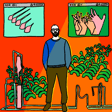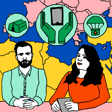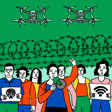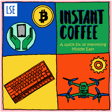Become a Creator today!Start creating today - Share your story with the world!
Start for free
00:00:00
00:00:01

1.1. Reporting the Lebanese Thawra with Megaphone's Jean Kassir
On this first episode of Instant Coffee, Omar al-Ghazzi (@omar_alghazzi) talks to Jean Kassir about covering the Lebanese revolution in times of Coronavirus. Jean is co-founder of Megaphone news, an independent media platform covering Lebanon and the region. You can find Megaphone on: Facebook: www.facebook.com/megaphone.news/ Twitter: twitter.com/megaphone_news Instagram: www.instagram.com/megaphonenews/
Transcript
Opening: Anti-system Sentiment and Political Struggles
00:00:00
Speaker
It's undeniable that today the opposition is weak. Despite the fact that there is an overwhelming anti-system and anti-government sentiment, we are yet not able to capitalise this into really building political leverage and fighting the upcoming political battles in an efficient way.
Introduction to Instant Coffee Podcast
00:00:21
Speaker
This is Instant Coffee, a new podcast brought to you by the LSE Middle East Centre and produced by me Nadine Almanasvi and me, Ribel Slim and Heydar.
00:00:33
Speaker
On this episode, Amal El-Razi talks to Jean Ocir about reporting the Lebanese revolution.
Interview: Reporting the Lebanese Revolution
00:00:39
Speaker
Amal is assistant professor in the media department at LSE. Jean is co-founder and managing editor of Megaphone News. Megaphone is a Beirut-based independent online media platform which promotes critical thinking, transparency and accountability. Over to you, Amal.
Megaphone's Origins and Activism Roots
00:00:55
Speaker
Hey, hi everyone. I'm very excited today to speak to Jean Assir, the co-founder of Megaphone. Jean, let's immediately have you talk to us about Megaphone. So could you tell us what was the inspiration behind Megaphone?
00:01:13
Speaker
When and how did it get started? Yeah, so basically we started the project in 2017 and it was in the continuity of the 2015 popular uprising that was triggered by the garbage crisis in Beirut and that basically was sort of a culmination of the anti-establishment sentiment that has been building up since 2011 and then 2013, 2014 with the extension of the parliament mandate.
From Activism to Journalism: Anti-establishment Narratives
00:01:38
Speaker
So back then it was becoming more and more obvious that there is a sizable chunk of the population that was really fed up with the current establishment and at the same time the opposition groups were starting to get more institutionalized and getting prepared for the upcoming elections.
00:01:57
Speaker
All of us knew each other from university, from student activism, the secular club, and we've also been through the different kind of milestones of this movement from 2011 till today.
Amplifying Marginalized Voices and Critiquing Establishments
00:02:09
Speaker
So we can say that, I mean, we were political activists before becoming journalists.
00:02:15
Speaker
And the drive to sort of switch hats and start doing media was mainly driven by two main gaps. The first has to do, in our opinion, back then with the fact that the entire discourse and narratives of the anti-establishment movement.
00:02:32
Speaker
needed to be more articulated and needed to be also more heard. And for us there wasn't any media platform that was doing this. Even the alternative media platform that we used to follow had maybe smaller following or were sometimes a bit elitist.
Digital Journalism in Lebanon vs. Arab World
00:02:48
Speaker
So for us it was imperative to have a platform that could be extremely critical of the establishment, both at the political level and the economic level, but also be an amplifier of the voice of the more marginalized. And here we mean refugees, the LGBT community, women, migrant workers and so on. So it was kind of bridging those two discourses under one umbrella.
00:03:10
Speaker
And when it comes to the forum, it's also important to mention that Lebanon took a lot of time to adapt to the digital age when it comes to journalism. So unlike other Arab countries which had a very booming and vibrant alternative
00:03:26
Speaker
media landscape after the Arab uprisings.
Megaphone's Social Media Focus
00:03:29
Speaker
It took a bit more time for Lebanon to get there. Of course, the alternative platforms were many, but when it comes to traditional platforms, they were not really adapting to the new tools that were offered by the digital media.
00:03:43
Speaker
So that meant, in a sense, that a large chunk of the population, mostly young people, were becoming more and more disinterested by politics at large because they were no longer consuming their news and accessing news through TVs or through radios or through print. And there wasn't really an offering on social media that was crafted and adapted to the way they consume news and basically the way they behave on those platforms.
00:04:07
Speaker
So for us, the fact that we were born on social media and not as a website is also a defining feature of the project in the sense that we crafted the product and the formats to the platforms we were in, which is Facebook and then Instagram and then Twitter.
Reacting to Lebanese Protests
00:04:22
Speaker
So we played the game till the end. We're not huge fans of those platforms that host us, but our priority was to reach the largest audience and that's how we did it.
00:04:39
Speaker
And of course, within Lebanon and the Arab world, the visibility of megaphone was associated with the protests and the revolution in 2019. So can you describe to us the way that you covered the Lebanese protests? The protests were a big shift for us for many reasons. First, before the protests, our rationale was that we really needed to make politics interesting again for young people.
00:05:07
Speaker
Not that it wasn't in the sense that they weren't aware that everything around them was political and was affecting their lives, but there was really a disinterest from following the day-to-day politics because of the reason I mentioned earlier that has to do with traditional media.
Documenting Protests and Countering Narratives
00:05:21
Speaker
So the type of journalism we kind of adopted before was more what we can call slow journalism and extainer journalism. So we were very much interested in doing commentary and unpacking rather than following news on a day-to-day basis and having something to say that extremely reactive.
00:05:37
Speaker
So what happened with the uprising in 2019 is that we had to shift this logic altogether. Out of the sudden, there was a huge demand for more political content, for more analysis, more critiques. And at the same time, the old way of doing it, which is mostly slow pieces, mostly explainer pieces, was no longer working.
00:05:58
Speaker
So without really doing proper planning for it or having large editorial meetings, it came naturally and we started covering on a day-to-day basis. And we completely reshuffled our grid of outputs to actually match what was happening, I mean the historical moment that was happening.
00:06:16
Speaker
and we covered it in several pieces. We had a lot of underground presence, so we were very much interested in documenting and also amplifying some voices in the uprising.
Explaining the Economic Crisis
00:06:31
Speaker
We started in Beirut and then very quickly we tried to cover the entire country and particularly Tripoli which was the epicenter of the uprising as many could argue. We also did a lot of work when it comes to countering the official narratives and the counter-revolutionary narratives that were coming out of the establishment and this took several forms. Of course we have the
00:06:55
Speaker
commentary video to end up videos that we used to do on let's say major events but we also had a very specific format for that period which was called the fkikhitab or speech deconstruction so we used to pick up a speech from let's say Prime Minister Hariri or Hassan Nasrallah or Jabran Basir or Aoun
00:07:14
Speaker
And really, they constructed it like four minutes. And for us, it was a way to balance out, in a sense, the lack of visibility of our own discourse on traditional media and to also a bit kind of give people the bottom line and criticize that bottom line in the speeches of officials without really having to stay two hours and to give these people what they want, which is basically an unchallenged one-way conversation.
00:07:42
Speaker
So when you have leaders on TV, it's usually a flow of speech that's uninterrupted and journalists really can't intervene. That's particularly true for Hassan Nasrallah and for also other leaders. So that was quite interesting and got a lot of positive feedback and engagement.
00:07:59
Speaker
And finally, we did a lot of work when it comes to unpacking and covering the economic crisis. So the revolution happened at the time where the economic system was really collapsing and it was getting worse and it is still getting worse by the day.
Pandemic's Impact on Protests and Political Coverage
00:08:15
Speaker
So access to simple and clear information was a must for most of the people. And that's also where we started doing again our explainer pieces, but then focused much more on the economic news.
00:08:28
Speaker
So that's a good segue to ask you about the situation now in Lebanon and how has megaphones coverage adapted to the changing circumstances, particularly in relation to the COVID-19 Corona crisis? I mean, that was a huge challenge, to be honest.
00:08:46
Speaker
If we want to be fair, we cannot say that the protests started fading out because of COVID. This had happened before. But it's absolutely fair to say that the corona crisis really kind of put everything on hold and paused everything.
00:09:01
Speaker
So for us, in terms of coverage, we had several challenges. The first was to find a way to cover this entire change in the parameters of the game and hence adopt COVID as a lens rather than a story of its own, a lens that would shape all aspects of politics from the most obvious ones, which is basically the measures being taken by the government to social issues and other stuff.
Government Measures and Health Crisis Management
00:09:27
Speaker
So we also adapted the grid of outputs. We started having more reactive cards that follow the story related to COVID on a day-to-day basis. But editorially, we identified priorities, which is we knew for sure that the government would use this state of emergency and would use this health crisis to actually be highly opportunistic. So they would be using this time to pass specific laws that are highly unpopular,
00:09:55
Speaker
or to enforce specific measures without kind of popular resistance. And so we worked on a lot of topics that are tackling these issues. And particularly, we can say that we worked on the idea of the police state. So in a sense, the fact that this whole Corona crisis in Lebanon was highly militarized, and the police had a huge role in dealing in the army as well, in dealing with the crisis and managing it on a day-to-day basis,
Opposition Weakness Amid Economic Crisis
00:10:23
Speaker
was also an opportunity for the establishment and the people in power to silence opposition voices and to use this time of crisis to actually summon people for investigation, jail people, and a crackdown very violently on protests that erupted during that phase.
00:10:40
Speaker
As a very brief summary of what's going on today, economically we're really heading to the unknown. We don't really know how things are going to unfold. All the scenarios will not prevent us from having a very deep social crisis.
00:10:56
Speaker
It's just a matter of damage control at this stage. At the same time, the old practices, the corrupt practices are not stopping. On the contrary, we still have scandals of corruption that are emerging by the day.
Foreign Funding and Media Influence
00:11:10
Speaker
And also what is quite unfortunate is that
00:11:13
Speaker
The popular uprising, the revolution, is also in a crisis of structure, in a crisis of really imposing itself as a political alternative, and that's of course not, I mean, no one's to blame. It's unfortunate circumstances, it's the fact that
00:11:30
Speaker
maybe Lebanon didn't have the same structure of syndicates and opposition parties as maybe other countries, and also the fact that the situation is really extremely complex. But it's undeniable that today the opposition is weak. Despite the fact that there is an overwhelming anti-system and anti-government sentiment, we are yet not able to capitalize this into really building political leverage and fighting the upcoming political battles in an efficient way.
00:12:15
Speaker
There's a lot of sensitivity in the region, as you know, about foreign funding for media and NGOs and how it may affect editorial policies. Critics would say
00:12:25
Speaker
We're
Funding Challenges and Editorial Independence
00:12:27
Speaker
that even if there is no direct editorial oversight, somehow funding may steer editorial policy in a certain
00:12:27
Speaker
going to the festival. We're going to the festival. We're going to the festival.
00:12:39
Speaker
direction that is more acceptable to Western funders. So can you tell us from Megaphone's experience how it has navigated this in terms of where it gets its funding from? Yeah, sure. I mean, first, let me start by saying that this concern is very fair, but at the same time, there's a huge crisis when it comes to funding independent journalism worldwide.
00:13:01
Speaker
And that's not only a global south issue, that's actually a global issue. For us, we started as a completely self-funded and volunteer-based project. So we were actually working for free and even paying the rent of the space where we used to work and also other costs.
00:13:18
Speaker
And then it was becoming unsustainable. So like every other outlet, we had the choice to either start putting our content on paywall, behind the paywall and then asking readers to contribute. And for us, that wasn't an option because we were really extremely pragmatic about that and wanted to reach as many people as possible. The other option was to apply for grants with all the conditions that are obvious for us, which is zero interference in the editorial line.
00:13:48
Speaker
which is what we did. And so far, we didn't have any friction or tension when it comes to what we would say, even the most radical stuff that we published or actually said on Megaphone by our donors. Of course, it's undeniable that there is a tension, like any form of sponsored or funded initiative, but I would say that that's the best compromise we can reach at the moment.
00:14:14
Speaker
But we are also, like all other independent outlets in the region and worldwide, seeking other sources of funding, more sustainable sources of funding that are not tied to the international development money, which are revenue generation outlets and opportunities, basically.
Social Media Reach and Alternative Media Principles
00:14:34
Speaker
And, I mean, there are several ways, several creative ways to raise funds, including also crowdfunding, including
00:14:41
Speaker
helping, getting help from the Lebanese diaspora through contributions and all of that. But really, I mean, to be fair, this funding that we received first was really essential for our growth. We couldn't have grown otherwise that fast. And in terms of trade-off, I don't think that there is any compromise that was ever made on the territory line. On the contrary, there was actually a lot of empowerment when it comes to the donors that promoted this project.
00:15:21
Speaker
Sadly, as you say, there's a lot of financial pressure on media outlets in Lebanon and a lot of them have closed over the past few years. So does Megaphone have an ambition to become more mainstream or it sees itself within the model of an alternative source?
00:15:39
Speaker
I mean, definitely mainstream in terms of the reach and the audience and the impact. That's definitely our ambition. And I personally think that to be mainstream today and to reach the masses, quote-unquote, you have to be on social media. And TV and print is not more mainstream when it comes to the reach.
00:15:58
Speaker
If by mainstream we mean getting into the whole logic of the market and becoming sort of like any other commercial outlet, I think that there are some principles when it comes to the vision of how we would like to go about this project that would prevent us from having the same sort of business model
00:16:16
Speaker
than other outlets. But we're definitely aiming at becoming a mainstream platform very soon and we're also trying to find ways to make this project much more financially sustainable and independent.
Backlash and Sparking Debate
00:16:29
Speaker
And have you received any backlash over the work that you do? How would you describe the reception beyond the educated elite? I mean, we receive backlash from all sorts of people, including the quote unquote educated elite. So it's really, I mean, it varies a lot. The main backlash is usually from political party supporters. That's usually when we issue a piece that they think is quite provocative for their parties. We get a lot of insults.
00:16:58
Speaker
We receive another sort of more violent backlash, but that's on the street. When we do our job of reporters, when our team films on the ground, they often get beaten or intimidated by the security forces. But even among the quote-unquote revolution crowd, sometimes we do receive backlash on the pieces that we publish because we make it a point not only to provide and publish crowd pleasers,
00:17:27
Speaker
So we have very often provocative pieces that steer debates. Sometimes even among our writers, we have writers not fighting, but actually publishing opposing views. So we are actually seeking this debate. It's not something that makes us unhappy.
Opening Platform to Diverse Voices
00:17:44
Speaker
If everybody was happy with what we would publish, that would have actually been an issue and to have required a really serious reconsideration of how we do our work.
00:18:05
Speaker
Yay, yay, yay.
00:18:09
Speaker
And some writers in Lebanon, particularly women, report a toxic social media environment that finds them sometimes refraining from writing out of fear of getting ridiculed or bullied on social media. So while there is a lot of solidarity, obviously, in the revolutionary times, is it your experience that there's also this toxic environment when it comes to writing? That's definitely true.
00:18:39
Speaker
That's also one of the motives that pushed us to develop the opinion page the way we did. So usually the opinion page in the Arab world is dominated by very old people and male in a sense. And also there is a very narrow definition of what is deemed political and what qualifies as a political opinion.
00:18:58
Speaker
What we did with our opinion page is that we really opened it to women, to younger people, to Lebanese, non-Lebanese, and to people basically who usually don't have a platform on these pages.
Embracing Multidisciplinary Media Approaches
00:19:11
Speaker
Because precisely of what you said, because there's a lot of people who feel discouraged or are not even invited to share their opinion. And also the definition of the opinion piece
00:19:21
Speaker
was reshaped in a sense and the definition of the political in itself was also broadened to include also a gender issue. Okay and some of our listeners may be interested in starting a platform like Megaphone or maybe pursuing a career in journalism in the region. Do you have any words of advice to tell them? I mean it is very awkward because I didn't study journalism and
00:19:47
Speaker
most of the people in the team aren't necessarily journalists by what they studied at university. So I don't know what could be the advice. For us, there was a lot of just throwing ourselves in the unknown. And obviously, there was a lot of passion in it. And there was a lot of luck. But I think what made Megaphone actually successful is the fact that the team was multidisciplinary.
00:20:16
Speaker
So we had at the same time people who were journalists with people who have been studying social sciences, so they have a different lens on things, as well as people who are coming from a design and comms background. So I think this mix was actually super beneficial to create the type of products that we create.
00:20:35
Speaker
So I think this is sort of the future of this profession and of media at large.
Closing: Subscribe to Instant Coffee Podcast
00:20:40
Speaker
So I would definitely advise to think beyond the classic box of journalism defined in a very strict way and really open up to other disciplines and create these fusions that are actually quite interesting. Okay, great. Thank you very much, Jean, for your time. This was a great conversation. Thank you. Thank you. And thanks for having me.
00:21:06
Speaker
Thank you for listening to Instant Coffee, your quick fix of everything Middle East. Join us every Friday for a new episode of Instant Coffee, where we interview artists, activists, writers, journalists, and more from the region. To find out more about megaphone news, follow the links in the podcast description. Also, make sure to subscribe to our podcast to stay updated on our latest episodes. Don't forget to follow us on Twitter, Facebook, and Instagram. Until next time,



















